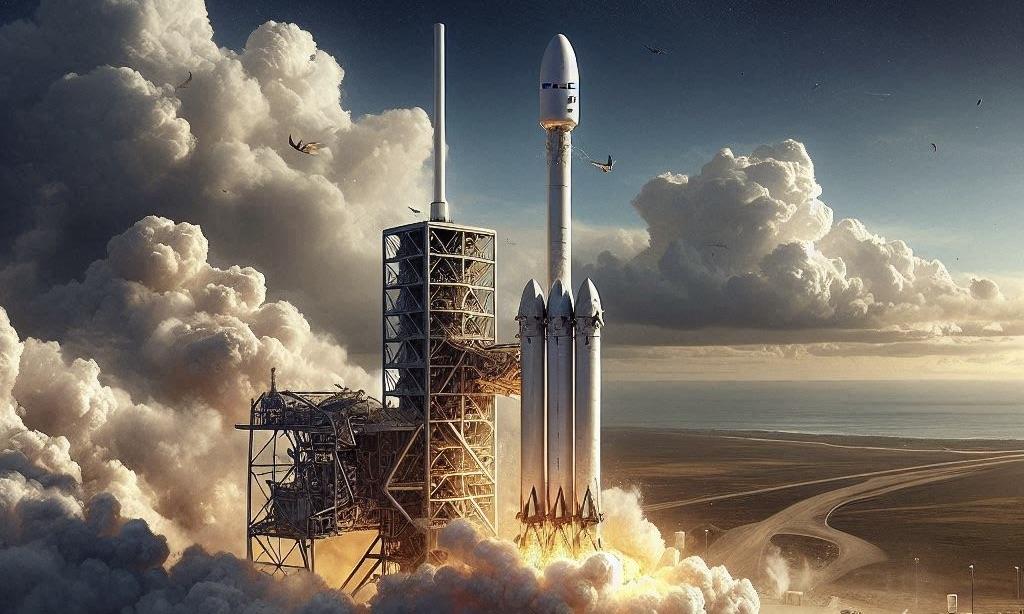During an ongoing FAA investigation into a recent Starlink mission anomaly, SpaceX has requested permission to relaunch its Falcon 9 rocket. The mishap involved a liquid oxygen leak, which affected the deployment of 20 Starlink satellites on July 11.
SpaceX Requests Falcon 9 Relaunch Amid FAA Investigation into Starlink Mission Anomaly
During the Federal Aviation Administration (FAA) investigation into a mishap last week, SpaceX requested authorization to relaunch its Falcon 9 rocket, according to Teslarati.
The FAA is investigating a mishap that transpired during the Starlink 9-3 mission earlier this month.
On July 11, SpaceX launched its Falcon 9 rocket with 20 Starlink internet satellites attached. However, a liquid oxygen leak caused an anomaly, which prevented the second stage from circulating its orbit before the discharge of the high-speed internet devices.
The issue with the Starlink satellites was elaborated upon by SpaceX CEO Elon Musk:
“Upper stage restart to raise perigee resulted in an engine RUD for reasons currently unknown. Team is reviewing data tonight to understand root cause. Starlink satellites were deployed, but the perigee may be too low for them to raise orbit. Will know more in a few hours.”
Shortly after that, the FAA issued a statement:
“The FAA is aware an anomaly occurred during the SpaceX Starlink Group 9-3 mission that launched from Vandenberg Space Force Base in California on July 11. The incident involved the failure of the upper stage rocket while it was in space. No public injuries or public property damage have been reported. The FAA is requiring an investigation.”
SpaceX Seeks FAA Approval for Falcon 9 Relaunch Amid Ongoing Investigation
Despite the ongoing investigation, SpaceX intends to recommence Falcon 9 launches before the FAA concludes its analysis.
Space X submitted a request to the FAA on July 15 to regain the ability to launch the rocket before the agency's investigation's conclusion, as reported by Spaceflight Now.
“The FAA is reviewing the request and will be guided by data and safety at every step of the process. The FAA is responsible for and committed to protecting the public during commercial space transportation launch and reentry operations. The FAA is reviewing the request and will be guided by data and safety at every step of the process.”
In two scenarios, the FAA would permit a rocket to resume flight operations after an issue: It would grant sanction for a launch operator-led mishap in its final investigation report, necessitating the operator to identify and resolve corrective actions.
The other is a “public safety determination,” which would only be valid if “the mishap did not involve safety-critical systems or otherwise jeopardize public safety,” the FAA said.



 FDA Targets Hims & Hers Over $49 Weight-Loss Pill, Raising Legal and Safety Concerns
FDA Targets Hims & Hers Over $49 Weight-Loss Pill, Raising Legal and Safety Concerns  Toyota’s Surprise CEO Change Signals Strategic Shift Amid Global Auto Turmoil
Toyota’s Surprise CEO Change Signals Strategic Shift Amid Global Auto Turmoil  Tencent Shares Slide After WeChat Restricts YuanBao AI Promotional Links
Tencent Shares Slide After WeChat Restricts YuanBao AI Promotional Links  TSMC Eyes 3nm Chip Production in Japan with $17 Billion Kumamoto Investment
TSMC Eyes 3nm Chip Production in Japan with $17 Billion Kumamoto Investment  Nvidia, ByteDance, and the U.S.-China AI Chip Standoff Over H200 Exports
Nvidia, ByteDance, and the U.S.-China AI Chip Standoff Over H200 Exports  Instagram Outage Disrupts Thousands of U.S. Users
Instagram Outage Disrupts Thousands of U.S. Users  Prudential Financial Reports Higher Q4 Profit on Strong Underwriting and Investment Gains
Prudential Financial Reports Higher Q4 Profit on Strong Underwriting and Investment Gains  TrumpRx Website Launches to Offer Discounted Prescription Drugs for Cash-Paying Americans
TrumpRx Website Launches to Offer Discounted Prescription Drugs for Cash-Paying Americans  Alphabet’s Massive AI Spending Surge Signals Confidence in Google’s Growth Engine
Alphabet’s Massive AI Spending Surge Signals Confidence in Google’s Growth Engine  Missouri Judge Dismisses Lawsuit Challenging Starbucks’ Diversity and Inclusion Policies
Missouri Judge Dismisses Lawsuit Challenging Starbucks’ Diversity and Inclusion Policies  Weight-Loss Drug Ads Take Over the Super Bowl as Pharma Embraces Direct-to-Consumer Marketing
Weight-Loss Drug Ads Take Over the Super Bowl as Pharma Embraces Direct-to-Consumer Marketing  CK Hutchison Launches Arbitration After Panama Court Revokes Canal Port Licences
CK Hutchison Launches Arbitration After Panama Court Revokes Canal Port Licences  SpaceX Pushes for Early Stock Index Inclusion Ahead of Potential Record-Breaking IPO
SpaceX Pushes for Early Stock Index Inclusion Ahead of Potential Record-Breaking IPO  Once Upon a Farm Raises Nearly $198 Million in IPO, Valued at Over $724 Million
Once Upon a Farm Raises Nearly $198 Million in IPO, Valued at Over $724 Million  OpenAI Expands Enterprise AI Strategy With Major Hiring Push Ahead of New Business Offering
OpenAI Expands Enterprise AI Strategy With Major Hiring Push Ahead of New Business Offering  American Airlines CEO to Meet Pilots Union Amid Storm Response and Financial Concerns
American Airlines CEO to Meet Pilots Union Amid Storm Response and Financial Concerns  Nvidia CEO Jensen Huang Says AI Investment Boom Is Just Beginning as NVDA Shares Surge
Nvidia CEO Jensen Huang Says AI Investment Boom Is Just Beginning as NVDA Shares Surge 































